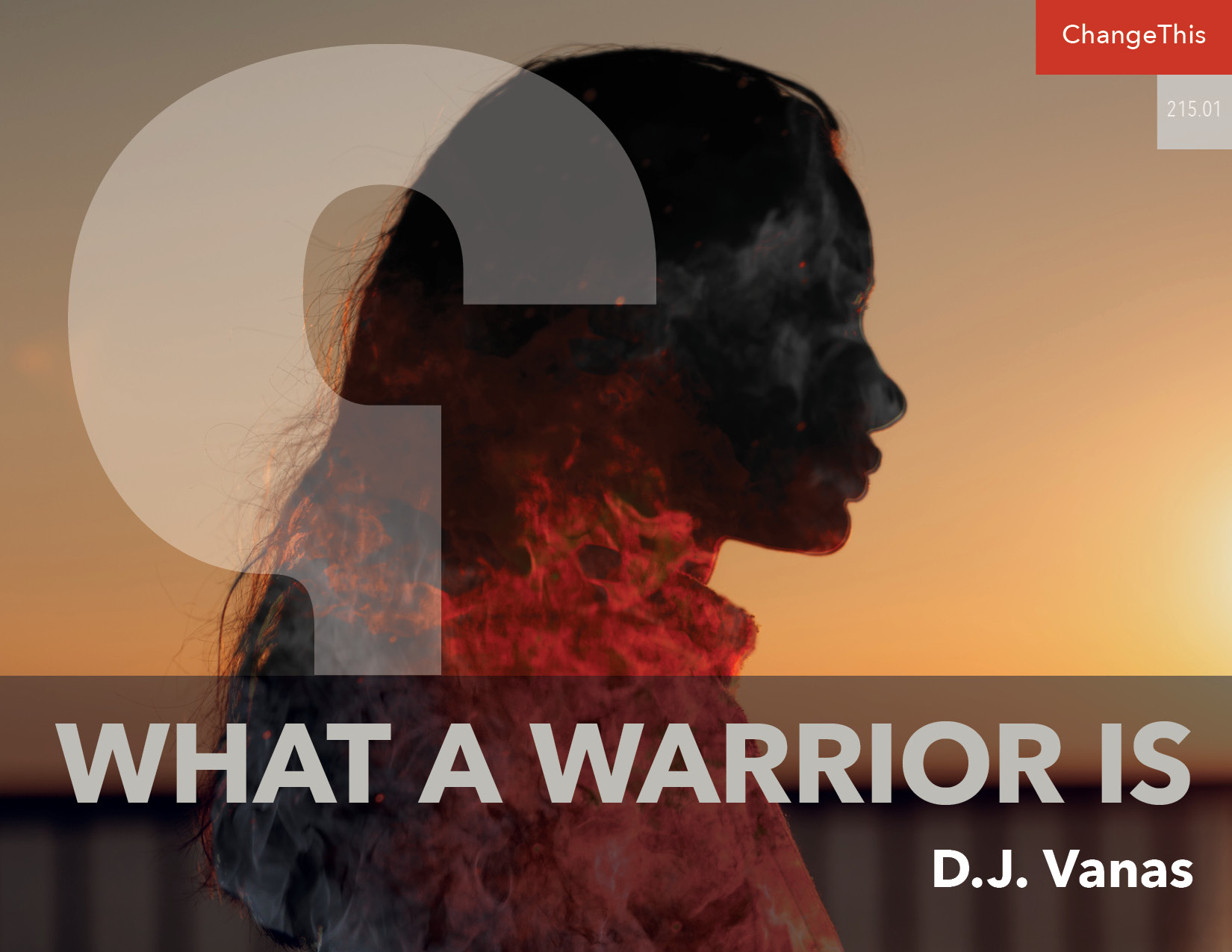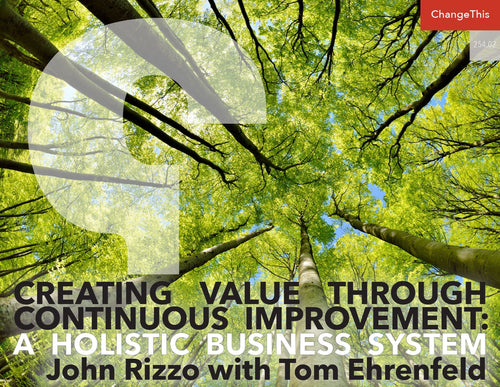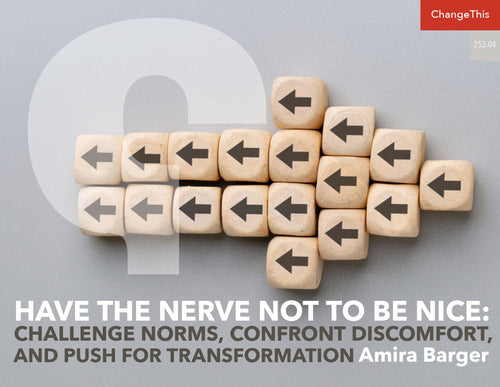What a Warrior Is
A warrior is different from a fighter.
A warrior needs to be a fighter, but there is a difference in being a fighter and a warrior. A fighter is someone who leverages their time, talent, and effort toward an objective, and the primary beneficiary is that individual. This is critically important in self-improvement and spurs us to go back to school, leave bad relationships, get a better job, stand up for ourselves, or lose weight. We need to be willing and able to fight for the things that improve our life or else they don’t happen.
However, fighting for the self is not the role of a warrior. Warriors take those hard-earned lessons and skills and use them to serve others and impact their world in a positive way.
My friend Nancy Griffin (SaginawChippewa) is a powerful example of how a fighter can become a warrior. She grew up in an abusive home and married an abuser. She wanted to serve and fight for others as a rehabilitation counselor to help those with disabilities get employment, but she first had to fight for herself. She went back to school, but says, “I would go to classes after being beat up, which was usually around finals, with black eyes, broken nose, and broken bones. You get to a place where you think this is all life has to offer.” But a committed passion to serve pulled her through her fear, doubt, and painful situation.
Through lots of support, encouragement, and a warrior spirit in action, Nancy started making different choices, including a divorce. She decided to change her circumstances by changing her choices. “A medicine man prayed for me and told me I had a future, though many times I couldn’t see beyond the moment.”
Nancy fought step by step to change her situation, get her education, and become a warrior equipped, trained, and able to serve others. Because of her, several hundred people have become successfully employed over the expanse of her career. At one point, Nancy had the highest success rate in the state of Michigan for minority youth getting and maintaining employment!
A WARRIOR FIGHTS FOR SOMETHING BIGGER THAN THE SELF
My people (Ottawa) called a warrior ogichidaa and that term has little to do with what we see in the media portrayal mentioned earlier. It’s not about being the toughest person, it’s not about seeking glory, and it doesn’t require a uniform or combat boots. A warrior is fully engaged to develop their talent and ability over a lifetime to become an asset to the “tribe” they serve. Today, that tribe might be your family, community, company, students, patients, clients, or taxpaying citizens. But make no mistake, we all have one to serve.
A WARRIOR NURTURES THEIR WARRIOR SPIRIT
In our tribal communities, the warrior role was a spiritual endeavor as much as anything else. Between ceremonies, prayer, sacrifices, and use of holy medicines, spirit was interwoven throughout all their actions and intentions. When our spirit is involved in an activity, the activity itself becomes a spiritual event, and we’re answering to a higher power and higher purpose. We’re all in. When we incorporate our own spiritual beliefs and practices into our efforts, it can pull us through pain and fear and help us get out of our own way to accomplish what we set out to do.
Your warrior spirit is the driving force to face and overcome challenges and to develop yourself so you can serve and contribute to your tribe. It is a can-do, persistent, resilient, optimistic, uncompromising attitude composed of grit, determination, love for what is fought for, consistent focus, courageous commitment, and a willingness to own mistakes. Your warrior spirit is that voice inside you that shouts, “I will find a way forward!” and surpasses motivation.
In my experience, it is so often the missing piece in personal or professional success and serving others well. We can have all the resources in the world when it comes to budget, time, or personnel, but if the warrior spirit is missing, those resources won’t translate into success. After all, the greatest obstacle to delivering great service to others is usually not a lack of resources anyway. The greatest obstacle is often apathy.
You may have encountered and leveraged your own warrior spirit when you overcame a challenge that scared the hell out of you, navigated a dramatic change, had to work harder than you thought possible, were painted into a corner, backed up against a wall or in crisis. You dug deep in those moments and pulled out that “no-quit force.”
A WARRIOR IS DRIVEN BY SERVICE
There are three reasons why service is at the heart of the warrior role:
First, service is our highest calling and most fulfilling endeavor—not just to tribal warriors, but to us as warriors in our roles too. Think on the purpose of our being and our role within the human family. If we’re not put here to be of service to others, why are we here at all? A warrior is clear in their purpose, which is to feed and protect their tribe, not their ego.
Second, service is our deepest need. Everyone has a need to feel valued, that our work matters, that we matter. You have it, I have it, our kids, clients, and teammates have it. And we can get some of that need f ulf illed when we are of service to others. How wonderful is that?
Third, service is our legacy. It’s what we leave behind us when we’re gone. I’ve served over five hundred tribal nations in the last twenty-five years, and when those tribal communities lose an elder, they have a feast in their memory where they reflect on that elder’s life and what made them special. Guess what they talk about? Not the elder’s nice clothes, the car they drove, or where they vacationed. They talk about who they helped, encouraged, or guided. They laugh about the stories that elder shared to brighten someone else’s day when they needed it most. They discuss the times that elder provided a shoulder to cry on or shared stories of hope, strength, or wisdom with those who needed them most. They talk about their legacy, the beautiful moments left behind that were born from serving others well.
In the same way, when we are gone from this world, the legacy we’ll leave behind us lives on through the moments of connection, service, and impact we had in other people’s lives. And we’re creating that legacy each day of our journey.
A WARRIOR LEADS WITH LOVE ABOVE ALL ELSE
Let’s talk about love. A fight for anything requires energy, focus, and time—all are valuable resources. So if you don’t love what you’re fighting for, then why the hell are you fighting for it? Why is it even on your radar? When we love what we’re fighting for, as our warriors of the past did for their people, we are willing to make hard choices and are committed to seeing them through. Our heart is a powerful element in our warrior role and including it in our efforts is a game changer. When we’re able to incorporate these two critical elements into our warrior role, we become unstoppable.
A WARRIOR MAY SURRENDER, BUT THEY NEVER QUIT
Though our tribal warriors were not able to stem the tide of Manifest Destiny, technological advances, and endless waves of settlers and soldiers, one would be hard-pressed to lodge an argument that our warriors didn’t fight and negotiate with maximum effort. In fact, many warriors like Crazy Horse and Chief Joseph would have fought until the bitter end but were thinking of the future of their people and tribe when they finally surrendered. This required the warrior principle of fighting for (and thinking of) something bigger than self. Our warriors may have surrendered, for the good of their people and the survival of the tribe, but they never quit!
When we quit, we just stop trying and putting forth the effort. We start talking ourselves out of the challenge, point-ing out why it won’t work, and finding selective proof that we’re right in our assessment. “It’s too hard,” or, you might think, “I’m not sure.” Fear or frustration starts to dominate. When we quit, we feel the sting of walking away from something that could’ve been a success. The danger with quitting is that the next time things get tough, it’s much easier to quit the second time. It’s a bad habit to foster.
Surrender is something else, and it occurs when we come to the end of our power. We realize we have no more leverage, our actions are no longer effective or having any impact, we can do no more to change or improve the situation, and maybe we see we’re doing more harm than good. There’s no shame in surrender, and in fact it can be one of the bravest things we do. Asking for help, finding another way, or letting something go that isn’t working anymore—whether that’s a job or a relationship—requires courage. When we make the distinction between quitting and surrender, we gain clarity and guidance as we fight through our challenges.
And let’s be clear on the term “victory.” Victory is not necessarily creating a spectacular outcome that is exactly the way we intended. We don’t necessarily control that dynamic. But victory can be defined by the amount and quality of dedicated effort we put forth—we do control that.
Some of the biggest victories I’ve ever had in my life happened in moments I could’ve defined as defeat, but knowing I put forth my best made it feel like a win and prepared me for the next challenge.
When I was a senior at the U.S. Air Force Academy, I took on a Don Quixote–like quest to train for a spot on our coveted USAFA boxing team in the Wing Open tournament. Everyone thought I was nuts. Senior year, our first-class year, was supposed to be enjoyed to maximum (legal) level. This was a military academy, after all, and I devoted years there to high-tempo, grueling activities, rigid structure, and mind-scorching academics. Nevertheless, I trained my guts out for the boxing team, suffering painful shin splints, cutting twenty pounds down to my fight weight, and sometimes eating only an apple for dinner.
Then, two weeks before the tournament, I broke my nose for the second time, and this time, the crack went toward my eye orbital. This meant I was done. And I was devastated. I had a heart-to-heart with Coach Weichers and cried in his office. The legendary coach, not known for warm fuzzies, not only showed compassion that amazed me, but a few days later gave me a handwritten letter I carry to this day. In it, he praised my work ethic and dedication to a valiant attempt, though it may have fallen short of my own goal. For that reason, not making the team has never felt like a defeat.
Warriors served our tribal communities for millennia, and now their principles can be applied in our roles to get us better results in our ability to serve others today. Too many of us have misalignment of intention and execution that so often leads to burnout. After all, the biggest threat to delivering great service isn’t lack of resources, it’s apathy.
At the end of the day, a true warrior doesn’t do it for the glory, doesn’t go it alone, isn’t arrogant—and is definitely not bulletproof. A warrior fights for something bigger than self, nurtures their warrior spirit, incorporates love as a source of strength, and understands that service is at the heart of it all. Finally, under the right circumstances warriors may surrender, but they never quit.
After all, victory is in the effort, not necessarily the outcome. I was reminded of that working with the Special Olympics in Florida a few years ago. I was assisting a preteen boy named Trey during a surfing match. At least in my mind, I thought we were competing for points. He eagerly tried and would giggle with delight every time he caught a wave. He was eager and giggled even when he didn’t catch a wave. His vision of victory was just to do his best in the activity, not to best anybody else. And if you don’t know the motto for the Special Olympics, I’ll share it here:
“Let me win. But if I cannot win, let me be brave in the attempt.”
Now that is a motto worthy of a warrior . . .
Excerpted from The Warrior Within.
Copyright © 2022 by D.J. Vanas.
All Rights Reserved.
ABOUT THE AUTHOR
D.J. Vanas is an internationally-acclaimed speaker for Fortune 500 companies, hundreds of tribal nations, and over 7,000 audiences nationwide. An enrolled member of the Ottawa Tribe of Michigan and a former U.S. Air Force officer, he inspires others to practically apply the power of the warrior spirit in business and in life. He is the author of The Tiny Warrior and Spirit on the Run and was featured in the PBS film The Warrior Tradition. He hosted the Discovering Your Warrior Spirit show on PBS. He lives in San Diego.











































